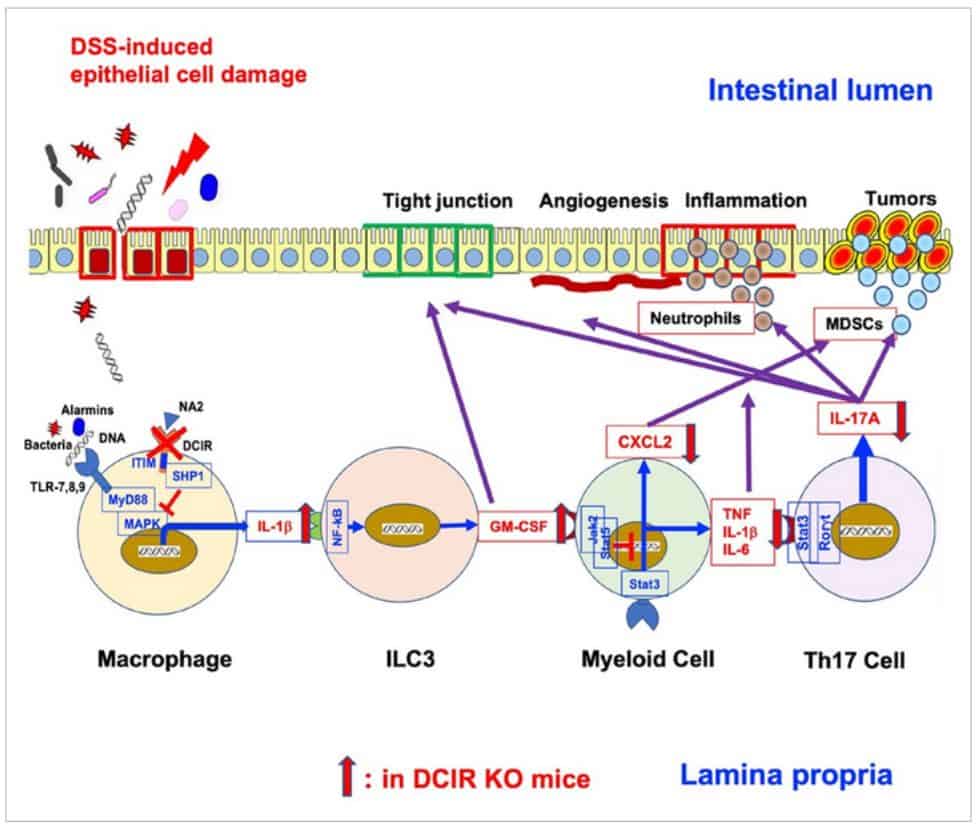Inflammatory bowel disease (IBD) is a general term for Crohn’s disease and ulcerative colitis, both of which are characterized by chronic intestinal inflammation that could lead to colorectal tumors. Understanding the pathophysiology of IBD is thus critical for reducing the incidence of colonic tumors.
It turns out that IBD is caused by innate immune receptors, especially those that are expressed in the gut, like C-type lectin receptors (CLRs). CLRs are essential for controlling the gut microbiota and defending against infections, as well. Therefore, a tricky balance must be achieved to preserve intestinal homeostasis.
One CLR called dendritic cell immunoreceptor (DCIR) is in charge of keeping the immune and skeletal systems in balance. According to earlier research, DCIR appears to negatively control both innate and acquired immune responses. Therefore, blocking DCIR might enhance immunity against colon malignancy. Its function in intestinal immunity, however, is still unknown.
In this context, a Japanese study team led by Professor Yoichiro Iwakura of the Tokyo University of Science (TUS) has shed light on this topic. In their research, published today in the international journal Cell Reports, the team looked at how colon tumors and colitis developed in mouse models without DCIR.
To do this, the team fed the mice drinking water containing azoxymethane (AOM), a neurotoxic chemical, and dextran sodium sulfate (DSS), a synthetic sulfated polysaccharide, in order to generate colon cancers compared to those seen in humans with IBD.
They were shocked to see that the animals without DCIR had less severe colitis and less colorectal tumor growth brought on by AOM-DSS. Additionally, the DCIR-deficient animals displayed less body weight loss and less proinflammatory cell infiltration in the colon as compared to the wild-type mice (control).

What do these findings suggest? According to Prof. Iwakura, “Our findings point to the fact that intestinal carcinogenesis and inflammation are facilitated by DCIR signalling, which points to the possibility that blocking DCIR might prevent ulcerative colitis and colon cancer.”
The study also found that the use of an antibody called “anti-NA2” against asialo-biantennary-N-glycans (NA2), a ligand (binding molecule) to DCIR, decreased DSS colitis symptoms and prevented colorectal tumor growth, supporting this theory.
The researchers are very happy with these results. Prof. Iwakura believes that his findings have potential uses in medicine since they “suggest that therapeutics targeting DCIR and its ligands could be used to effectively treat autoimmune diseases, IBD, and cancer, which have been traditionally difficult to treat.”
Certainly, this work could pave the way for novel treatment options for treating colorectal cancers, so enhancing not only the lives of IBD patients but also our knowledge of the pathophysiology of human diseases.
Image Credit: Getty
You were reading: New Drug Target Offers Hope For Patients With Colorectal Tumors
